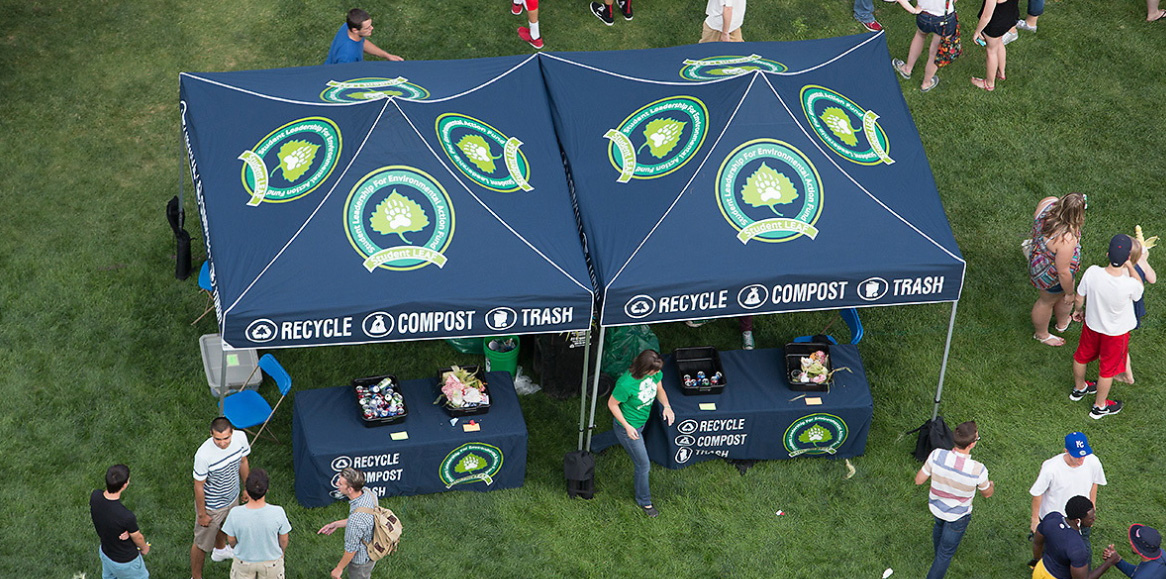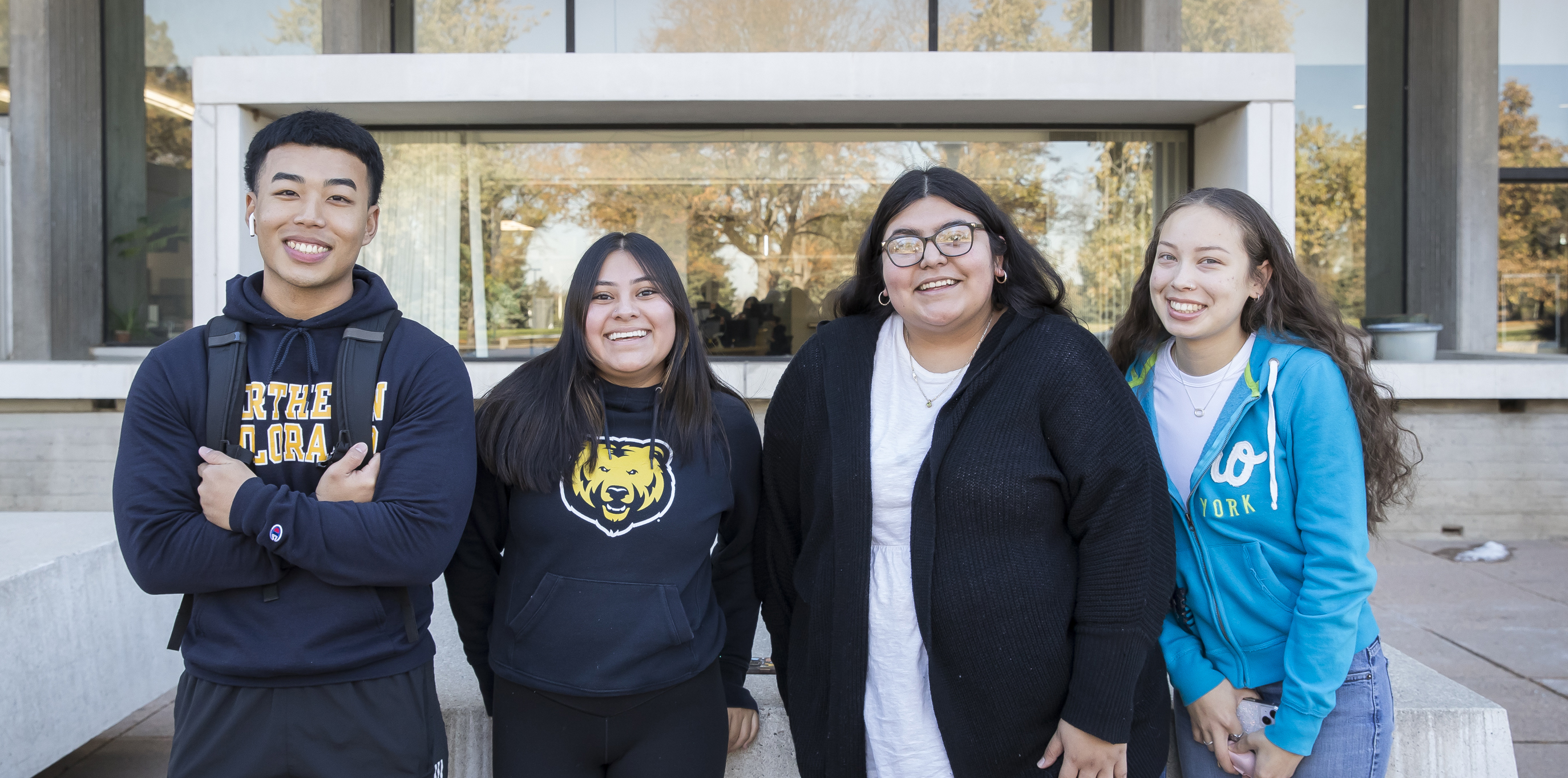
Every Tuesday after most classes have ended, a group of students meet inside a conference room in the University Center to discuss new initiatives the university could take on to become more environmentally sustainable.

Slade Caltrider
“Right now, our three main focuses are water usage, mainly through sprinklers, composting and solar panels,” Environmental Sustainability junior Slade Caltrider said.
Caltrider is the president of Student Leadership for Environmental Action Funds (LEAF) at UNC. He has been involved in the student committee for three years now, starting off in social media outreach then becoming the grant coordinator and finally, the president. Caltrider says the need for environmental advocacy drives his interest in LEAF.
“We’re dealing with a water crisis right now, a drought is coming on, Lake Mead is drying out and getting lower, so dealing with resources to make sure we’re using them as efficiently and as effectively as we can is super important,” Caltrider said. “And having this push at a college level educates people that when you go out into the world, think about your usage and know how much you’re contributing to the world in general.”
Hundreds of UNC students have shared the same passion as Caltrider over the years, prompting the development of a Sustainability minor in 1970, a bachelor’s degree in 2011 and the creation of LEAF in 2012, which was originally proposed by students as part of a senior seminar class. Throughout the past decade, several successful environmentally friendly projects have been implemented on campus. One that stands out in Caltrider’s mind is the 2019 installation of a solar flower near the César Chávez Cultural Center to reduce the university’s carbon footprint. The device provides 2,500 watts of power to meet the majority of the center’s needs.
“So, how it works is the petals of the flower are solar panels, and during the night they're all closed up,” Caltrider said. “Then, around seven in the morning, the petals open and they move around tracking the sun. So, I think that’s pretty cool because it’s getting as much solar energy as it can throughout the day, and the cost of the motor to turn it is way less than it’s bringing in.”

There are more than 50 other LEAF successes to note including the installation of water bottle fillers, campus recycle bins, new bike racks, a permaculture garden, animal waste stations, irrigation control and large ceiling fans in the University Recreation Center to reduce energy use, utility costs and increase comfort for students. The last project alone cost the committee $80,000.
"Our budget is based off of how many students are currently attending the university,” Caltrider explained. “Each semester, every student is assigned a $10 fee to their student bill. So, $10 multiplied by how many students we have is our budget and based off that, we get a project proposal and see if it's worth funding or if we should save for another time and come back to it.”
The students are responsible for deciding which projects will be the most beneficial for the university. At a recent LEAF meeting, one of the projects being reviewed was updating some of the exterior lighting at Jackson Soccer Field House to LED, energy saving lights. The project will cost around $7,000 and was ultimately approved based on a strategic scale that considered the following: will the project demonstrate a return on investment, a return on the environment, address gaps in campus sustainability needs, provide educational opportunities for students, what is the project feasibility and does it have strong social equity and project visibility?
"One of the highlights of my job is getting to work with students as they contribute to a more sustainable university,” LEAF Staff Advisor and UNC’s Energy and Sustainability Manager Chris Bowers said. “The work of these students has been instrumental in projects like our 172 kW Solar PV array at Parsons Hall, our EV charging station at the University Center and the upgraded water saving irrigation controls across campus."
Caltrider says approving sustainable projects and witnessing the impact they have on campus is exceptionally rewarding. Even more so since he gets to do it alongside his fellow classmates who share the same environmental passion as his own.
“There are some awesome people in Student LEAF,” Caltrider said. “A lot of my classes are in the College of Natural and Health Sciences (NHS), but in LEAF we have some art students, some in theatre and one studying business, so it’s cool to diversify the people that I know.”
However, he says there is plenty of room for more student involvement.
“Our main goal is to let students know if you want change on campus in a sustainable environment reach out to us and let us know, because we’re probably your best chance of making it happen,” Caltrider said. “We love to see these types of projects happen, so bring any awareness issues to us.”
That determination to take action was recently recognized at the State Capitol. At the request of Senator Kevin Priola, legislators commended the students in LEAF and Earth Guardians, a second student-run environmental club at UNC, for their “commitment to resource efficiency and education initiatives at and around the University of Northern Colorado.”
“I’m constantly hearing from the university president, our city council and now from the state legislature that our students are advocating for sustainability in our community and across the region,” LEAF Faculty Advisor and Department of Geography, GIS and Sustainability Professor Chelsie Romulo, Ph.D., said. “They take on these initiatives themselves and are working hard to reduce our ecological footprints.”
Earth Guardians is an advocacy group that is part of an international network of youth leaders for environmental action and was started in 2016 by a group of students interested in promoting sustainability in Greeley and across the state.
For students who want to get involved in LEAF, check out a list of upcoming events. Follow Earth Guardians on Instagram for their latest news and activities.
– written by Sydney Kern
More Stories
-
Governor Polis Reappoints Two to UNC’s Board of Trustees
Este artículo no está en español.
-
State Farm Invests in Career Readiness Initiatives for UNC Students
Este artículo no está en español.
-
Commentary: The Importance of Investing in First-Generation Students
Este artículo no está en español.
-
Supporting First-Generation College Students to Become Next-Generation Leaders
Este artículo no está en español.




